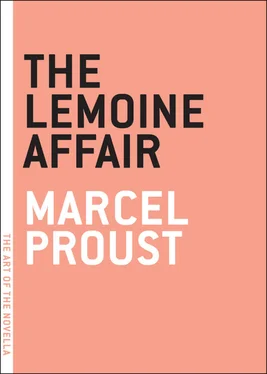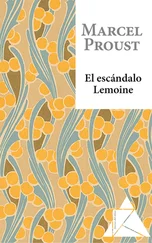The appeal of the walk one could have in the courtyard was not won by so many risks. One would go down into it around noon. The sun warmed the pavement, or the rain dripped from the rooftops. Sometimes wind made the weathervane creak. In front of the closed gate, monumental and covered with verdigris, a sculpted Hermes gave the shadow he projected the form of his caduceus. Dead leaves from nearby trees fell, swirling up to his heels, and folded onto the marble wings their wings of gold. Votive and potbellied, doves came to perch in the alcoves of the archivolt or on the splay of the pedestal, and often let fall a drab ball, flaky and gray. It splattered its intermittent, grainy mass on the gravel or on the grass, and, sticky with the grass it once had been, covered the grass abounding on the lawn and filling the footpath of what M. de Séryeuse called his garden.
Lemoine came often to stroll about there.
That is where I saw him for the first time. He seemed to be more aptly fitted in a lackey’s smock than clad in a doctor’s cap. The rogue claimed to be a doctor, though, in several sciences wherein it is more profitable to succeed than to which it is often prudent to devote oneself.
It was noon when his coach arrived, describing a circle in front of the steps. The pavement resounded with the team’s hooves; a valet ran up to pull down the folding step. In the street, women crossed themselves. The north wind blew. At the foot of the marble Hermes, the caducean shadow had taken on an elusive and shifty aspect. Pursued by the wind, it seemed to be laughing. Bells rang out. Between the bronze volleys of a great bell, a peal of smaller bells, out of time with each other, hazarded their crystal choreography. In the garden, a swing creaked. Dry seeds lay on top of the sundial. The sun shone and disappeared by turns. Agatized by its light, the Hermes of the threshold became darker from the sun’s obscuring than he would have been from its absence. Successive and ambiguous, the marmoreal face lived. A smile seemed to lengthen expiatory lips into the shape of a caduceus. The smell of willow, of pumice, of cineraria and marquetry escaped from the closed shutters of the office and from the half-open door of the vestibule. It made the dullness of the hour heavier. M. de Séryeuse and Lemoine continued to chat on the steps. One could hear an equivocal, shrill sound like a burst of furtive laughter. This was the gentleman’s sword, which clinked against the glass alchemical retort. The feathered hat of the one safeguarded him better from the wind than the silken nightcap of the other. Lemoine had a cold. From his nose, which he forgot to wipe, a little mucus had fallen onto his shirtfront and onto his suit. Its viscous, warm core had slipped down the linen of one, but had adhered to the cloth of the other, and held the silvery, fluent fringe that dripped from it in suspense above the void. The sun, piercing them, confused the sticky mucus with the diluted solution. One could make out just the one single succulent, quivering mass, transparent and hardening; and in the ephemeral brilliance with which it decorated Lemoine’s attire, it seemed to have fixed the prestige of a momentary diamond there, still hot, so to speak, from the oven from which it had emerged, and for which this unstable jelly, corrosive and alive as it was for one more instant, seemed at once, by its deceitful, fascinating beauty, to present both a mockery and a symbol.
V IN “THE GONCOURT JOURNALS”
21 December 1907 .
Dined with Lucien Daudet, who spoke with a touch of mocking gusto about the fabulous diamonds seen on the shoulders of Mme X …, diamonds being pronounced by Lucien in extremely fine language, upon my word, with an ever-artistic notation, with the savory spelling out of his epithets marking the wholly superior writer, as being despite everything a bourgeois stone, a little silly, not at all comparable, for instance, to the emerald or the ruby. And over dessert, Lucien let drop that Lefebvre de Béhaine had told him, Lucien, that evening, contrary to the opinion of the charming woman Mme de Nadaillac, that a certain Lemoine has discovered the secret of making diamonds. This would create, in the business world, according to Lucien, a furious commotion faced with the possible depreciation of still unsold diamond stocks, a commotion that could well end up reaching the judicial authorities, and bring about the imprisonment of this Lemoine for the rest of his days in some sort of in pace , for the crime of lèse-jewelry. This is more urgent than the story of Galileo, more modern, more open to the artistic evocation of a milieu, and all of a sudden I can see a fine subject for a play for us, a play that could contain strong things about the power of today’s big business, a power that at bottom drives government and the law, opposing whatever calamitous thing any new invention has in store for it. Like a bouquet, they brought Lucien the news, presenting me with the denouement of the already sketched play, that their friend Marcel Proust had killed himself after the fall in diamond shares, a collapse that annihilated a part of his fortune. A curious person, Lucien assured us, that Marcel Proust, a being who lives entirely in the enthusiasm, in the pious adoration , of certain landscapes, certain books, a person for example who is completely enamored of the novels of Léon Daudet. And after a long silence, in the glow of after-dinner expansiveness, Lucien stated: “No, it’s not because it concerns my brother, do not believe it, Monsieur de Goncourt, absolutely not. But finally the truth must be told.” And he cited this characteristic that emerged prettily from the illuminated elaboration of his speech: “One day, a gentleman performed an immense favor for Marcel Proust, who, to thank him, brought him to the country to dine. But while they were chatting, the gentleman, who was none other than Zola, absolutely refused to acknowledge that there had been in France only one single truly great writer to whom only Saint-Simon came close, and that this writer was Léon Daudet. Upon which, my word! Proust, forgetting the gratitude he owed Zola, sent him flying ten steps backwards with a pair of blows, and knocked him flat on his back. The next day they fought, but, despite the intervention of Ganderax, Proust was firmly opposed to any reconciliation.” And all of a sudden, in the clutter of the coffee cups being passed round, Lucien whispered in my ear, with a comic whine, this revelation: “Don’t you see, Monsieur de Goncourt, if even despite La Fourmilière I’m not aware of this fashion, it’s because I can see even the words people say, as if I were painting, in the capture of a nuance, with the same sfumato as Chanteloup’s Pagoda.” I left Lucien, my head all excited by this affair of the diamond and of suicide, as if spoonfuls of brain had just been poured into me. And on the staircase I met the new ambassador from Japan who, seeming ever so slightly freakish and decadent , making him resemble a samurai holding, above my folding Coromandel screen, the two pincers of a crayfish, graciously told me he had long been on assignment in the Honolulu Islands where reading our books, my brother’s and mine, was the only thing capable of tearing the natives away from the pleasures of caviar, a reading that was prolonged till very late at night, in one go, with interludes consisting only of chewing some cigars of the country that come encased in long glass tubes, which are supposed to protect them during the crossing from a certain distemper the sea gives them. And the minister confessed to me his taste for our books, admitting he had known in Hong Kong a very great lady there who had only two books on her night table: La Fille Elisa and Robinson Crusoe .
Читать дальше



![Marcel Proust - In Search of Lost Time [volumes 1 to 7]](/books/579170/marcel-proust-in-search-of-lost-time-volumes-1-to-thumb.webp)








